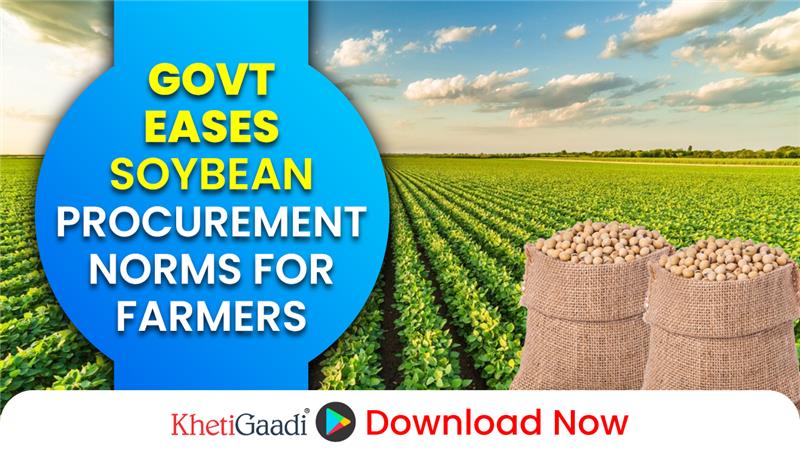New Relaxation for Soybean Procurement Under Price Support Scheme
In response to challenges faced by soybean farmers during the Kharif 2024-25 season, the Ministry of Agriculture has announced a one-time relaxation of moisture content norms for soybean procurement under the Price Support Scheme (PSS). This move will allow soybean stocks with moisture content of up to 15%, higher than the usual prescribed limit of 12%. The relaxation is aimed at helping farmers who have been impacted by unpredictable weather conditions, which have led to increased moisture levels in their harvests.
KhetiGaadi always provides right tractor information
A Response to Farmer Concerns
The decision, approved by the Hon’ble Agriculture Minister, comes after multiple representations from farmer groups and agricultural stakeholders. The aim is to provide relief to soybean producers who might otherwise face financial losses due to quality-related procurement constraints. The change will ensure that soybean farmers are not penalized for factors beyond their control, such as adverse weather patterns.
Financial Implications and Support for Farmers
Under the revised framework, any additional expenses or losses incurred due to the procurement of soybean with higher moisture content will be covered by the respective State Governments. The Central Nodal Agencies (NAFED and NCCF) will continue to process payments to State-Level Procuring Agencies (SLAs) while adjusting the value of the relaxed moisture content. Despite this, farmers will still receive the full Minimum Support Price (MSP) for their produce, ensuring that their interests are protected throughout the procurement process.
For personalized advice on improving your cultivation yield through organic methods, reach out to a KhetiGaadi counsellor at 07875114466 or email us at connect@khetigaadi.com.
Emphasis on Proper Storage and Preservation
The Ministry has also issued guidelines to prevent storage losses of soybean stocks with higher moisture content. It has instructed both Central and State-level agencies to adopt stringent measures for the handling, preservation, and storage of such stocks to prevent wastage or degradation. Close collaboration between central and state agencies will be vital to ensuring the smooth execution of this policy.
Boosting Farmer Welfare and Agricultural Stability
This decision underscores the government’s proactive stance in addressing the concerns of farmers and stabilizing the agricultural economy. By easing procurement norms, the Ministry aims to prevent distress sales, ensuring farmers are fairly compensated despite adverse conditions. The move reflects the government’s ongoing commitment to enhancing farmer welfare and ensuring agricultural sustainability in India.
Current Agricultural Climate and Impact on Soybean Farmers
As soybean farmers across India struggle with unpredictable weather patterns, such as delayed monsoons and fluctuating rainfall, the government’s intervention is timely. The decision to ease procurement norms is expected to provide significant relief to farmers who would otherwise be burdened with the impact of high moisture content on their harvests. With the risk of distress selling now mitigated, farmers will be able to hold on to their produce longer, potentially getting better prices during the season.
Furthermore, this policy could pave the way for more consistent procurement practices in the future, especially considering the rising challenges of climate change that affect crop quality across the country. The flexibility in procurement standards demonstrates the government’s understanding of the evolving agricultural landscape and the need for adaptive measures to safeguard farmers’ livelihoods. This relaxation may also encourage more farmers to continue investing in soybean cultivation, which has become increasingly important for India’s agricultural sector.
Stay updated with real-time information on agricultural schemes and innovative practices by following us on WhatsApp or visiting KhetiGaadi’s website regularly.
To know more about tractor price contact to our executive






